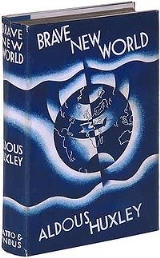
's fifth novel
, written in 1931 and published in 1932. Set in London of AD 2540 (632 A.F. in the book), the novel anticipates developments in reproductive technology
and sleep-learning
that combine to change society. The future society is an embodiment of the ideals that form the basis of futurology
. Huxley answered this book with a reassessment in an essay, Brave New World Revisited (1958), summarised below, and with his final work, a novel titled Island
(1962).
In 1999, the Modern Library
ranked Brave New World fifth on its list of the 100 best English-language novels of the 20th century.
Brave New Worlds ironic title derives from Miranda's
speech in Shakespeare's The Tempest, Act V, Scene I:
This line itself is ironic; Miranda was raised for most of her life on an isolated island, and the only people she ever knew were her father and his servants, an enslaved savage and a spirit.
Bokanovsky's process is one of the major instruments of social stability!![]()
They say somebody made a mistake when he was still in the bottle--thought he was a Gamma and put alcohol into his blood-surrogate.![]()
One hundred repetitions three nights a week for four years, thought Bernard Marx, who was a specialist on hypnopædia. Sixty-two thousand four hundred repetitions make one truth. Idiots!![]()
Community, Identity, Stability.![]()
No social stability without individual stability.![]()
Christianity without tears — that's what soma is.![]()
All the advantages of Christianity and alcohol; none of their defects.![]()
But I don't want comfort. I want God, I want poetry, I want real danger, I want freedom, I want goodness. I want sin.![]()
In fact, you are claiming the right to be unhappy.![]()
Bottle of mine, it's you I've always wanted! Bottle of mine, why was I ever decanted? Skies are blue inside of you The weather's always fine; For There ain't no Bottle in all the world Like that dear little Bottle of mine.![]()

